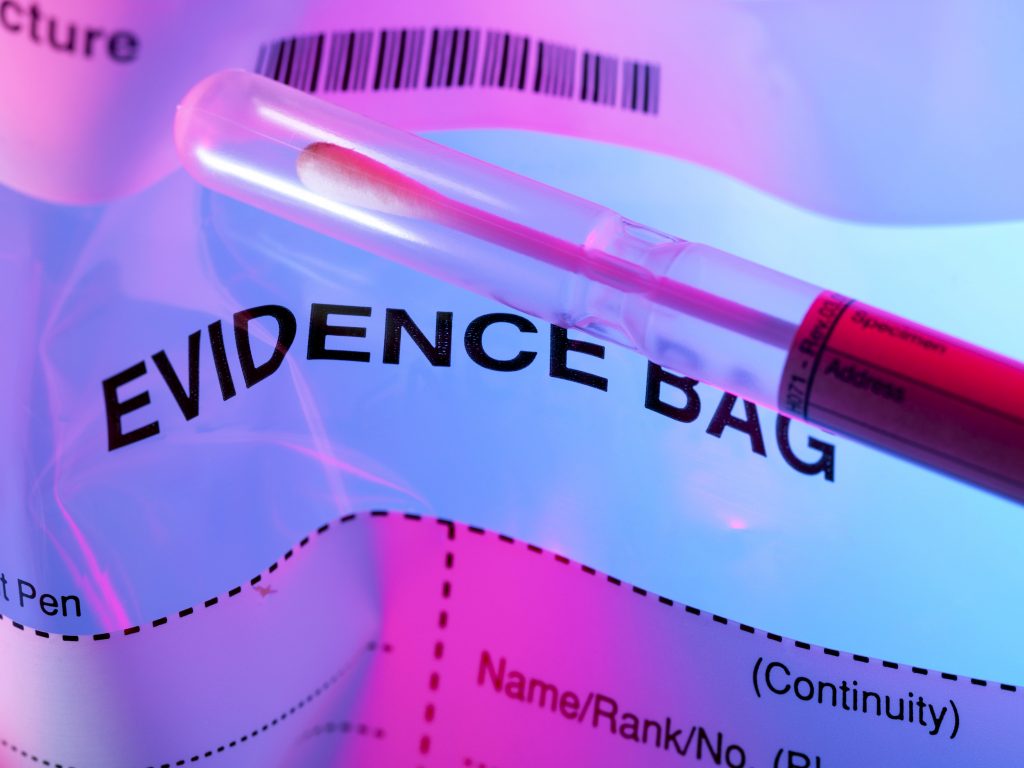Nurses in all healthcare settings encounter victims of violence. The Bureau of Justice Statistics reported the number of persons age 12 or older who had been victims of violent crime rose from 2.7 million in 2015 to 3.1 million in 2017 (up 17% from 2015), a 2-year increase of 455,700 victims. Attending to the needs of many of these victims — and those accused of crimes — are forensic nurses.
Table of contents:
- What Is Forensic Nursing?
- Who Is a Forensic Nurse?
- What Does a Forensic Nurse Do?
- Where Do Forensic Nurses Work?
- I’m a Registered Nurse. How Do I Become a Forensic Nurse?
- What Is Typical Coursework for an MSN in Forensic Nursing?
- What Is a SANE?
- How Do I Become a SANE Nurse?
- -NEW- How Does COVID-19 Affect Me as a Forensic Nurse?
- Other Forensic Subspecialties
- What Are Some Organizations Related to Forensic Nursing?
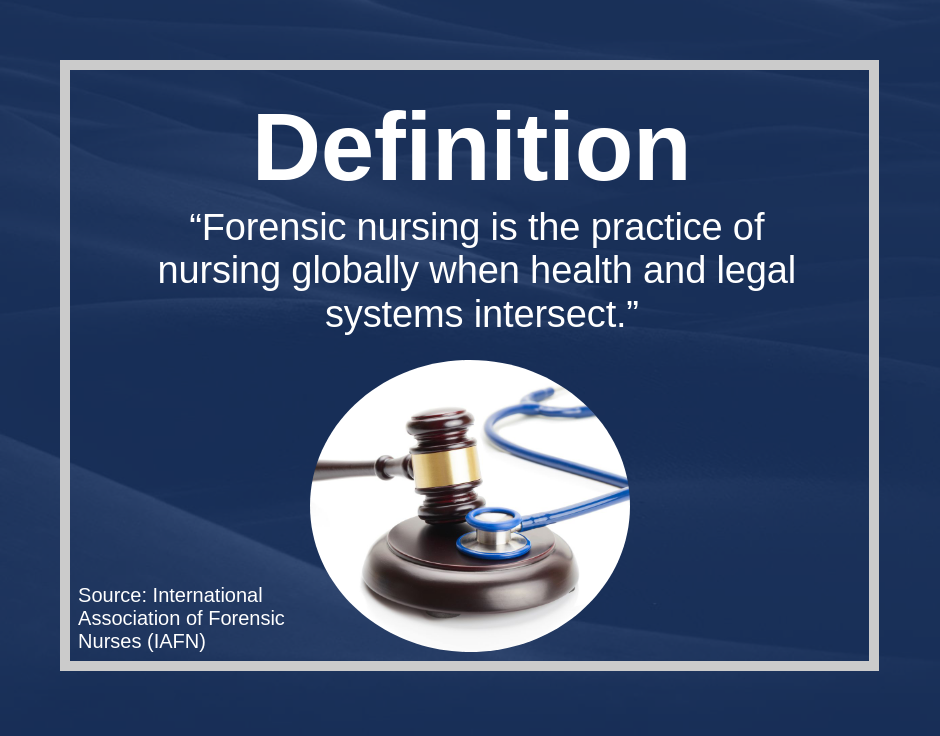
What Is Forensic Nursing?
Forensic nursing is the practice when health and legal systems intersect. Nurses in this area serve victims of domestic violence, sexual assault, neglect, human trafficking, homicide, abuse, intentional injury, and in the aftermath of mass disasters. Forensic nurses have specialized skills in injury identification, evaluation, and documentation.
“Forensic nurses are on the forefront of social change in reducing violence, providing care to vulnerable people, arresting human trafficking, and caring for traumatized individuals,” says Dr. Beaman, Aspen University’s Dean of Nursing. Dr. Nina Beamanalso serves on the membership committee on the IAFN.
Who Is a Forensic Nurse?
Many nurses — particularly in emergency departments — have informally practiced forensic nursing for many years without realizing it.
Every day, individuals are subject to abuse and are victims of intentional or unintentional trauma. Nurses routinely come into contact with these individuals; whether it’s a motor vehicle incident, occupational injury, sexual assault, interpersonal violence, gunshot or stab wounds, psychological abuse, or pediatric and elder maltreatment, to name a few. Emergency nurses are uniquely positioned to provide care for this population because they are often the first to evaluate a patient that has forensic needs.
According to the 2015 Forensic Nursing Scope and Standards of Practice — created by the IAFN and the American Nurses Association — “Because forensic nurses serve populations affected by trauma or violence—which are not limited to one setting and are not represented by a specific patient demographic—forensic nurses remain one of the most diverse groups of clinicians in the nursing profession (e.g., patient populations served, practice settings, and forensic and healthcare services provided).”
This high level of diversity and many RNs holding more than one nursing position at a time makes it very difficult to capture forensic nursing-specific data on surveys like the National Sample Survey of Registered Nurses. Although IAFN closed 2018 with 4,460 members in 31 countries, there is no way to dissect this number to determine which nurses work full-time, part-time, or irregularly as forensic nurses.
What Does a Forensic Nurse Do?
Forensic exams are administered to both victims of violence and those accused of causing harm. Forensic Nurses collect patient history, event history, conduct full-body exams, and assess for emergency contraception, STIs, STDs, and preventative care.
They may also collect evidence that can be used in criminal cases.
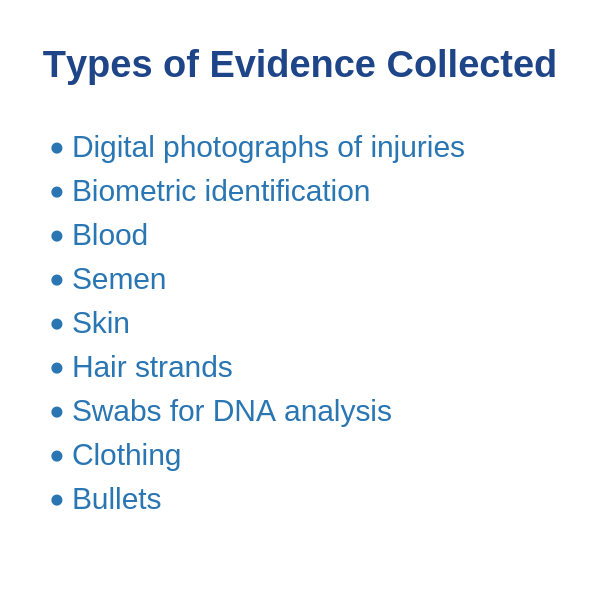
Beyond patient care and collecting evidence, forensic nurses assist with crime scene investigation, deliver testimony, work with multidisciplinary teams such as law enforcement, provide advocacy and counsel families. Some forensic nurse may even accompany their patients to appointments outside the hospital.
Where Do Forensic Nurses Work?
Forensic nurses can work in a variety of settings.
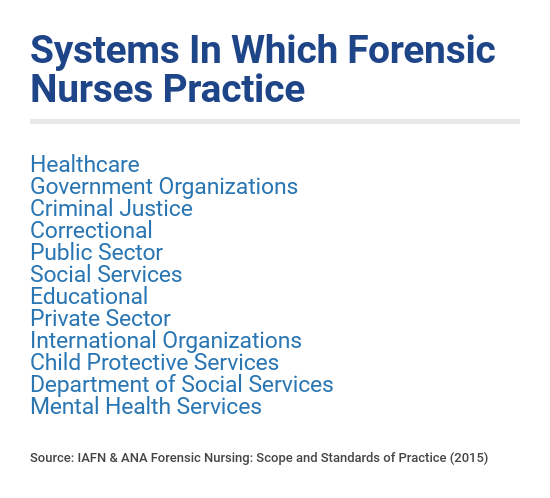
Most forensic nurses practice in emergency departments in hospital settings where they work either alone, as part of a team, or as an on-call specialist. Some hospital-based forensic nurses work as clinical risk managers and examine the circumstances in which patients or staff are injured or when an unusual death takes place.
“Not all forensic nurses work with violence,” says Aspen University’s Director of Graduate Nursing Programs, Dr. Marcos Gayol. “A forensic nurse also can work with vulnerable populations like immigrants, to assist with navigating the unique challenges they face with interactions with the Department of Homeland Security and U.S. Citizenship and Immigration Services.”
Forensic nurses also may work at sexual assault centers and organizations that deal with domestic violence, child advocacy, or mistreatment of the elderly. Sometimes, forensic nurses work with anti-violence programs, corrections facilities, psychiatric hospitals, or are called on to assist after a mass disaster or community crises. Forensic nurses can work within the justice system as legal nurse consultants or for government agencies like the FBI. They can also work in a medical examiner’s office doing death investigations. Advanced forensic nurse practitioners may be appointed as nurse coroners in some states, and the World Health Organization employs forensic nurses are Advisors and Consultants.
I’m a Registered Nurse. How Do I Become a Forensic Nurse?
Forensic nurses typically refine and develop their forensic nursing skills through clinical practice and continuing education. Here are a few routes to acquire forensic nursing training.
- Certification Programs – These programs provide relevant content, establish entrance requirements, and often include clinical internships that result in a certificate showing completion of coursework. However, these are not degree-granting programs.
- Continuing Education (CE) courses
- School of Nursing undergraduate, or graduate, elective courses in forensic nursing.
- Master’s of Science in Nursing (MSN) – Complete formal graduate study and clinical experience in a location such as a hospital, forensic crime laboratory, medical examiner’s office, or shelter for victims of domestic violence. The forensic nurse on this track receives a master’s degree in the specialty.
- RN to MSN Bridge Program – BSN and courses and the MSN graduate study listed in the bullet above.
An MSN in Forensic Nursing equips nurses with:
- Comprehensive forensic nursing knowledge
- Organizational skills necessary for writing reports, taking photos and collecting evidence
- Critical thinking skills
- Strategies to collect, record and preserve essential evidence
Experienced nurses who have already earned a BSN may want to consider the MSN in Forensic Nursing. RNs without a BSN can enroll in an RN to MSN program.
What Is Typical Coursework for an MSN in Forensic Nursing?
In a masters-level Forensic Nursing program, such as Aspen University’s Master’s of Science in Nursing with a specialization in Forensic Nursing — and RN to MSN program — you’ll learn about:
- The history and evolution of forensic nursing and the roles and responsibilities for forensic nurses in a variety of healthcare and non-traditional settings
- Frameworks for bridging the gap between medical/forensic information and law enforcement/investigative agencies and the criminal justice system
- The American correctional system including the history of law and corrections, punishment and rehabilitation of offenders, correctional practices ranging from probation to prison, and correctional trends
- In-depth exploration of current issues driving the evolving forensic nurse role such as human trafficking; sexual violence; at-risk and vulnerable populations; violence in the workplace; prevention and education; organizational and community consultation; policy/laws/regulation; advocacy; the nurse as expert witness; terrorism and torture; self-care and compassion fatigue prevention for the forensic nurse
Get an inside look of an Intro to Forensic Nursing MSN course.
What Is a SANE?
SANE is the largest subspecialty of forensic nursing. A Sexual Assault Nurse Examiner (SANE) is a “registered nurse who completed additional education and training to provide comprehensive health care to survivors of sexual assault. In some communities, SANEs are called Forensic Nurse Examiners.”
The National Intimate Partner and Sexual Violence Survey, published in 2010, showed that 1 in 5 women (18.3%) and 1 in 71 men (1.4%) will experience rape including completed forced penetration, attempted forced penetration, or alcohol/drug-facilitated completed penetration.
The role of the SANE includes evaluating and mindfully treating sexual assault patients to help preserve the victim’s dignity and lay the foundation for care.
The first SANE programs were established in Memphis, Tennessee, in 1976, offering a multidisciplinary, victim-centered way of responding to a sexual assault victim.
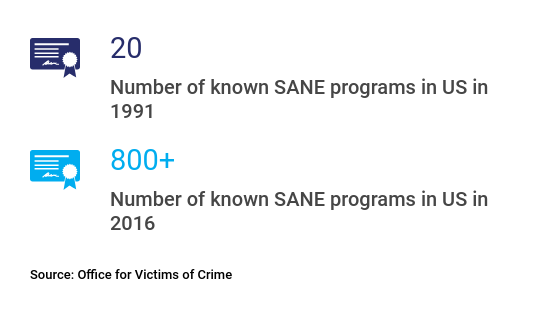
How Do I Become a SANE Nurse?
- Be an RN (or advanced practice).
- It is preferred that you possess 2 years or more experience in areas of practice that require advanced physical assessment skills.
- SANE training should meet the IAFN SANE Education Guidelines.
- SANE training will consist of both classroom and clinical elements.
- Have an understanding of local requirements as they vary from state to state.
How Does COVID-19 Affect Me as a Forensic Nurse?
Data suggests a worldwide increase in reports of domestic violence among restrictions imposed to keep COVID-19 from spreading. The COVID-19 public health crisis has also brought elevated risk to healthcare providers including in cases of medical forensic exams.
Depending on location, some nurses have had to modify the screening and triage process in accordance with public health advisories to avoid compromising or delaying patient care and protect the safety and wellbeing of staff.
Some modifications include:
- Providing medical care in a non-hospital facility or independent suite
- Advising patients in advance of whether family members or friends may be required to wait outside the exam suite or facility — or stay home — to reduce exposure to COVID-19
- Implement a COVID-19 response that limits foot traffic including visitors, support people, and law enforcement
- Considering 1 point of entry to the facility or center
- Allowing those with high-risk health conditions to opt-out of performing the medical exam
- Conducting triage — and COVID-19 symptom or exposure screening — by telephone in advance and before presenting to the exam facility
On Wednesday, March 25, the IAFN released the following statement:
We are working to continue to provide you, our members, and all forensic nurses with guidance for responding to patients who are impacted by violence during this public health emergency:
- Communicate to patients seeking treatment after abuse that the healthcare system is open and safe for them to access;
- Connect with your multidisciplinary partners and reassure them that you are still seeing and caring for patients;
- If your advocacy community provides hospital/exam accompaniment, reach out to discuss any questions, concerns, or limitations they may have in providing services;
- If an outbreak occurs in your community, take guidance directly from local health officials;
- If you work in an outbreak area, seek alternate locations (other than the emergency department) to provide care to your forensic patient populations.
Many resources exist to share with your community partners, but the most important message to share is remain creative and flexible so that access to patient care is not compromised or delayed. We are committed to monitoring the situation and keeping an open line of communication with you.
Other Forensic Subspecialties
Corrections: Forensic nurses work in prisons or correctional facilities where they provide care to a vulnerable population within the legal and justice system – apart from direct patient care, they are involved in crisis intervention as well as patient advocacy and education.
Death Investigation: A nurse who assists with death investigation must be an experienced and competent nurse, preferably with considerable experience in the ER and/or ICU. A nurse could also earn certification through the American Board of Medicolegal Death Investigators (ABMDI).
Intimate Partner Violence, Elder Abuse, and Child Maltreatment: Some forensic nurses complete specialized education and clinical preparation in the care of patients who have experienced physical and emotional abuse or neglect, intimate partner violence, elder abuse, and/or child maltreatment.
Forensic Psychiatric Nurse, Forensic Clinical Nurse Specialists, and other subspecialties might also be right for you.
What Are Some Organizations Related to Forensic Nursing?
International Association of Forensic Nurses – The IAFN is an international membership organization comprised of forensic nurses working around the world and other professionals who support and complement the work of forensic nursing.
Academy of Forensic Nursing – Formed in 2018, AFN’s has a mission of linking research to practice through the dissemination of scholarship, education, and service to those affected by and responding to trauma. Forensic nurses, physicians, attorneys, advocates, law enforcement and other first responders are all welcome to both AFN membership and to participate in the work of AFN.
Emergency Nurses Association – The ENA seeks to advocate for patient safety and excellence in emergency nursing practice. They envision themselves to be the global emergency nursing resource and advocate for Safe Practice and Safe Care.
American Association of Legal Nurse Consultants – The AALNC is a not-for-profit membership organization dedicated to the professional enhancement and growth of registered nurses practicing in the specialty of legal nurse consulting and to advance the nursing specialty.
American Academy of Forensic Sciences – The American Academy of Forensic Sciences is a multidisciplinary professional organization that provides leadership to advance science and its application to the legal system. The objectives of the Academy are to promote professionalism, integrity, competency, education, foster research, improve practice, and encourage collaboration in the forensic sciences.
Is This Your Calling?
A career in forensic nursing is compelling, rewarding, and mentally demanding. You will work with a wide variety of patients and get to use skills outside of traditional nursing. The only thing left to answer is, “Is this the right path for you?”

